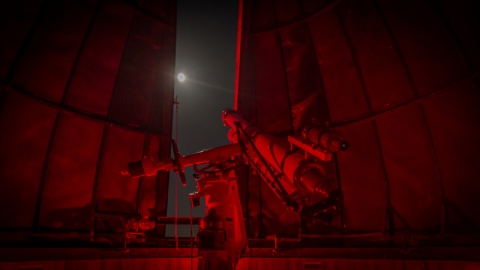

Cosmologists provide one of the most accurate measurements of the Hubble Constant to date
9 November 2018
2 min read
Researchers from the University of Portsmouth have come up with a new measurement of one of the most debated topics in cosmology.
Three cosmologists from the University’s Institute of Cosmology and Gravitation analysed new data to provide one of the most accurate measurements of the Hubble Constant to date.
The Hubble Constant has a long and contentious history with famous disagreements between astronomers, with people still debating its value after nearly a century of measurements.
The Hubble Constant is the local expansion rate of the Universe and is the cornerstone of modern cosmology. This expansion was first measured by Edwin Hubble in 1929 and is known as Hubble’s Law. A key part of this law is Hubbles’ Constant, which represents the exact expansion rate now (i.e., how fast space is expanding in our local cosmic neighbourhood).
We have used this new data, and new methodology, to obtain one of the most accurate measurements of this constant to date. In fact, I’m surprised how good it is.
Professor Bob Nichol, Acting Pro Vice-Chancellor (Research and Innovation)
To obtain this new measurement, the ICG researchers used a new methodology, the ‘inverse distance ladder’ method, to add new cosmological results using Type Ia supernovae from the Dark Energy Survey (DES) to existing distance measurements.
Professor Bob Nichol, Acting Pro Vice-Chancellor (Research and Innovation) and co-author of the study, said: “We have used this new data, and new methodology, to obtain one of the most accurate measurements of this constant to date. In fact, I’m surprised how good it is.
“Our value does not agree with local measurements of the Hubble Constant which could be telling us something fascinating about our Universe.”
This work is the culmination of many years of work in collaboration between scientists in China and the UK. Gong-Bo is one of our brightest stars holding a joint position between NAOC and here at the ICG.
Professor Bob Nichol, Director of the Institute of Cosmology and Gravitation
The study is one of eight new papers presenting exciting results from DES, of which the University of Portsmouth is an institutional member (in 2006). They will be presented at a special DES meeting at the Royal Astronomical Society in London today (9 November).
Professor Nichol and his ICG colleague Ed Macaulay are co-authors on a number of these papers and are lead authors on the Hubble Constant study, with Professor David Bacon, also from ICG.
They will be joined by two PhD students Benjamin Thomas and Maria Vincenzi who will also be presenting their supernova results at the meeting.
